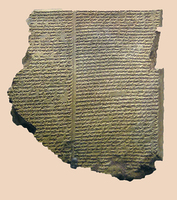- England
- Scotland
- France
- Holland
- Germany
- Italy
- Spain
- Portugal
- USA
- China
- Japan
- India
- Iran
- Advice
- Gardens
- England
- Scotland
- France
- Holland
- Germany
- Italy
- Spain
- Portugal
- USA
- China
- Japan
- India
- Iran
- Advice
- Garden Tours
Born - Died : ? - circa 2500BC
The Epic of Gilgamesh, written in Akkadian, is one of the world's oldest literary works and is thought to have been an important influence on Homer. The epic was found written on clay tablets in the palace library in Assyria's capital city, Nineveh. Gilgamesh had ruled at Uruk in Mesopotamia during the first half of the third milennium BC. The Epic tells the story of a great king and warrior. Gilgamesh defeated Engidu who then became his friend. They set forth together against Humbaba the guardian of a cedar forest. The passage quoted by Gothein, in the opening section of Chapter 2 of her History of Garden Art, draws attention to the earliest description of a sacred wood in which 'The ways are straight, and the path is wrought fair. They see the cedar mount, the dwellings of gods, the sanctuary of the Irnini.' She sees it as 'a kind of starting-point, for the park of history'.
Gilgamesh was two thirds god and one third human. After some failed attempts at achieving personal imortality he decided that it would be a better thing to achieve a degree of imortality through his own work in making a wonderful city with wonderful gardens. He shdeserves to be the 2/3rds god of landscape architecture, as Mars is the god of war and venus the goddess of love and beauty.
I will sing the song of …… athletic strength, the man of battle. …… the king, the man ……; my king ……, my lord …… garden ……. …… courtyard, …… Äipar;} {(1 ms. has instead:) …… his mother who bore him spoke to the lord: "My king …… in the river, my lord …… your garden."
My lord, having sought entry into the garden planted with junipers, the lord, coming from the Äipar, sheared the wool of the fleecy sheep ……; …… he sat down ……. The king …… bending …… with the oar; the prince covered …… with the oar, as if it was of flourishing reed. You covered their wicked ones, as if ……, with water. He gave …… to his mother who bore him. In the wide courtyard ……, Gilgameš …….
A woman, respectful of An's words, was walking along; a woman, respectful of Enlil's words, was walking along, and took the tree and brought it into Unug, into Inana's luxuriant garden.
The woman planted the tree with her feet, but not with her hands. The woman watered it using her feet but not her hands. She said: "When will this be a luxuriant chair on which I can take a seat?" She said: "When this will be a luxuriant bed on which I can lie down?"
He gave Ḫuwawa's first aura to the fields. He gave his second aura to the rivers. He gave his third aura to the reedbeds. He gave his fourth aura to the lions. He gave his fifth aura to the {palace} {(1 ms. has instead:) debt slaves}. He gave his sixth aura to the {forests} {(1 ms. has instead:) the hills}. He gave his seventh aura to Nungal(the goddess of prisoners) .
The below illustration is of the Flood Tablet from the Epic of Gilgamesh, written in cuneiform script on a clay tablet.
